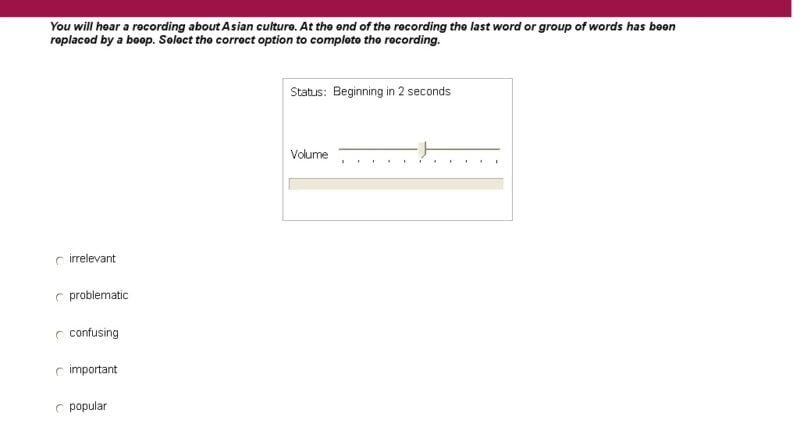
The Select Missing Word question type in the Listening Section of the PTE Academic Test can be a little tricky but is an excellent opportunity to showcase your ability to understand context and predict meaning in spoken English. In this post, we’ll break down this task type, explain how it works, and share some actionable tips to help you maximize your score.
What Is the Select Missing Word Task?
In the Select Missing Word question, you listen to an audio recording (usually a monologue or a dialogue) and are asked to choose the correct word or phrase to complete the final sentence of the recording.
Here’s how the question works:
1. You’ll hear a short audio recording.
2. The last word or phrase of the recording is replaced by a beep or tone.
3. You must select the correct option from a list of 3-5 words or phrases that best completes the sentence and fits the context of the audio.
What Does the Task Test?
This task tests your ability to:
• Understand context: Can you grasp the main idea and supporting details of the recording?
• Predict meaning: Can you anticipate the logical conclusion of a sentence based on the content and tone of the speaker?
• Listen carefully: Can you detect keywords and clues in the audio that point to the missing word?
Success in this task type requires active listening and the ability to make educated guesses when necessary.

Common Challenges in Select Missing Word
1. Unfamiliar Vocabulary: The options may contain advanced or less common words.
2. Audio Speed and Clarity: The speaker may talk quickly, making it difficult to catch all the details.
3. Lack of Context Understanding: Focusing only on individual words rather than the overall meaning can lead to mistakes.
Strategies to Ace the Task
1. Predict the Missing Word While Listening
As you listen to the audio, pay attention to the speaker’s tone, context, and flow of ideas. Try to anticipate what the final word or phrase could be.
• Example: If the speaker is describing environmental challenges and ends with “This could lead to catastrophic… [beep],” you might predict words like “damage,” “effects,” or “consequences.”
2. Focus on the Overall Meaning
Don’t get bogged down by individual words or unfamiliar vocabulary. Instead, try to understand the gist of the audio. Ask yourself:
• What is the speaker talking about?
• What is the purpose of the speech? (e.g., informing, persuading, describing)
• How does the sentence logically conclude?
3. Take Note of Signpost Words
Signpost words (e.g., therefore, however, as a result) can help you understand the direction of the argument. These are usually strong indicators of what kind of word might fit in the blank.
4. Eliminate Implausible Options
After listening, look at the answer choices and eliminate those that are clearly irrelevant or don’t match the context. This increases your chances of selecting the correct option.
• Example: If the recording discusses positive aspects of a project, an answer choice like “failure” is unlikely to be correct.
5. Pay Attention to Tone and Emotion
Sometimes, the speaker’s tone can give you clues. If the tone is optimistic, the missing word is likely to have a positive connotation. If it’s critical, the word might have a negative connotation.
6. Practice Active Listening
Train your ears to catch key words, phrases, and patterns in English. You can improve this skill by regularly listening to podcasts, audiobooks, or TED Talks.
7. Manage Your Time
You only have a limited amount of time to listen and respond. Focus on the question, and don’t dwell too long on a single option.

Tips for Preparation
1. Practice with PTE Mock Tests
Mock tests simulate the actual exam environment and help you get used to the audio style and question format. Use high-quality PTE practice materials to familiarize yourself with this task type.
2. Improve Your Vocabulary
Building a strong vocabulary helps you understand answer choices and select the most appropriate word. Study word lists that cover academic and general English.
3. Listen to Diverse English Accents
The PTE test features speakers with different accents, including British, American, and Australian. Listening to diverse accents will improve your comprehension and boost your confidence during the exam.
4. Develop Contextual Guessing Skills
Even if you don’t know the meaning of a word, practice guessing its meaning from the surrounding context. This skill is invaluable for the PTE exam and real-life communication.
5. Review Common Phrases and Collocations
English often uses set phrases or collocations (e.g., “catastrophic damage,” “scientific discovery”). Familiarity with these will help you predict missing words more accurately.
What to Avoid During the Test
1. Don’t Overthink It
Sometimes your first instinct is the right one. If an answer feels correct, trust your gut and move on.
2. Avoid Guessing Blindly
While it’s okay to make an educated guess, don’t select an answer without any reasoning. Use the process of elimination and context clues.
3. Don’t Get Distracted by Unfamiliar Words
If the recording contains words you don’t know, focus on the parts you do understand. The main idea is usually enough to guide you to the correct answer.
Sample Question
Let’s try a quick example:
Audio Script:
“The rapid increase in urban populations has led to various challenges, such as traffic congestion, air pollution, and inadequate housing. As a result, cities must find innovative ways to tackle these problems to ensure sustainable… [beep].”
Options:
1. solutions
2. growth
3. development
4. disasters
Answer: The correct answer is development, as it logically completes the idea of sustainable cities and aligns with the context.

Final Thoughts
The Select Missing Word question in the PTE Academic Listening section might seem challenging at first, but with regular practice and the right strategies, you can master it. Focus on understanding the overall context, improving your vocabulary, and practicing active listening to build your confidence.
Remember, every question is an opportunity to demonstrate your listening skills, so stay calm, focused, and prepared.
Gaurav Thapa is an experienced instructor of English as a Foreign Language. He has eight years of experience teaching IELTS and PTE.